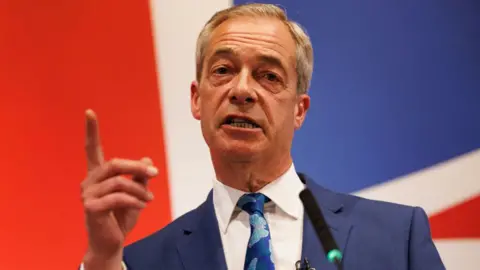Nigel Farage gives up ownership of Reform UK
 Getty Images
Getty ImagesNigel Farage has given up ownership of Reform UK, with the party saying it wants to give more control to its members.
Unlike most political parties, Reform was founded in 2018 as a private limited company, with Farage holding the majority of shares.
This is now being taken over by a newly registered business called Reform 2025 Ltd, according to Companies House filings, with Farage and his deputy Richard Tice no longer holding shares.
Party chairman Zia Yusuf said the move was "an important step in professionalising the party".
The two directors of Reform 2025 Ltd are Farage and Yusuf, according to Companies House. However, it says there will be "no persons with significant control".
Farage first promised to give up ownership of Reform UK last September.
In a statement posted on social media, Yusuf said: "We are pleased to announce that, as promised, Nigel Farage has handed over ownership of Reform UK to its members.
"Reform UK is now a non-profit, with no shareholders, limited by guarantee.
"We are assembling the governing board, in line with the constitution.
"This was an important step in professionalising the party. We will soon have more exciting announcements about Reform UK as we prepare for government."
Ben Habib, who quit the party after being ousted as its deputy leader, welcomed the move.
However, he said the party's constitution was "flawed" and puts Farage's leadership "in a virtually unassailable position".
Under Reform's new constitution, which was agreed at the party's conference in September, members can remove their leader in a no-confidence vote, triggered if 50% of them write to the chairman requesting one.
Reform MPs can also force a vote if 50 of them, or 50% of them, request one. But this only applies if there are more than 100 Reform MPs in Parliament and the party currently only has five.
Under the constitution, only three members of the party's board would be elected, with the remainder made up of the leader and chairman and other members chosen by the leader.
Asked why the board was not made up solely of elected members, Farage told GB News that the party he previously led, UKIP, had a fully elected National Executive Commission and it "became completely and utterly and totally ungovernable".
"There has to be some degree of trust amongst the members in the leader, in the leadership team," he said.
"But ultimately, if they don't like what I'm doing, they now have the means of removing me."

Sign up for our Politics Essential newsletter to read top political analysis, gain insight from across the UK and stay up to speed with the big moments. It'll be delivered straight to your inbox every weekday.
